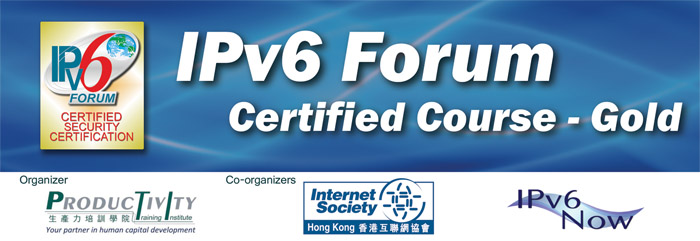 |
||
IPv6 Forum Certified Course (Gold Level) (28-31 Oct) |
||
Nature and ObjectivesThe IPv6 Forum is a world-wide consortium of leading vendors, Internet service vendors, National research & Education Networks (NRENs) and international ISPs, with a clear mission to promote IPv6 by improving market and user awareness, creating a quality and secure Next Generation Internet and allowing world-wide equitable access to knowledge and technology. The key focus of the IPv6 Forum today is to provide technical guidance for the deployment of interoperability through its IPv6 Ready Logo, Education Certification Logo Programs. This IPv6 Forum Certified Course (Gold Level) is recognized and certified by IPv6 Forum. This program provides an opportunity for networking professionals to understand the technical intricacies and acquire hands-on experience in order to integrate IPv6 in their networks. This is the first such course in Hong Kong jointly hosted by Internet Society Hong Kong and IPv6 Now. The program will feature content of real-world IPv6 concepts and deployment techniques. The program will also incorporate extensive hands-on lab exercises for practical deployment. Who Should AttendNetwork/ System Engineers, IT/ Product/ Operation Managers, System Administrators Those who would like to obtain IPv6 qualification as “IPv6 Forum Certified Engineer”. Medium of InstructionCantonese (English terms will be used where appropriate) Duration4 days SpeakersCourse ContentThe IPv6 Forum Certified Courses includes:
Course FeePrice: HKD12,000 Promotional price for early bird/ members: HKD9,800 Award of CertificatesParticipants who have attained at least 80% attendance will be awarded a certificate of attendance issued by Hong Kong Productivity Council and the certificate of IPv6 Forum Certified Engineer issued by the IPv6 Forum. ApplicationTo enroll, please download the enrollment form from website below and send it together with the appropriate fee to IT & Business Management (IBD), Hong Kong Productivity Council, 2/F, HKPC Building, 78 Tat Chee Avenue, Kowloon Tong, Kowloon, Hong Kong. Attention: Emerging Technology Unit. [All cheques should be crossed and made payable to the Hong Kong Productivity Council.] VenueHong Kong Productivity Council, 1/F, HKPC Building, 78 Tat Chee Avenue, Kowloon Tong, Kowloon, Hong Kong. (Kowloon Tong MTR Station Exit C) EnquiriesPlease call Ms. Kwok at (852) 2788-6271, Ms. Lo at (852) 2788-6266, fax (852) 2190-9774 or email: [email protected] Website: http://www.
COURSE DETAILS 1. IPv6 Address Representation 1.1 A hexadecimal primer 2. IPv6 Address Architecture 2.1 Networks 2.2 Interfaces, Masks 2.3 Address maps 2.4 Address aggregation/summarising 3. IPv6 Packet Format 3.1 The basics 3.2 IPv4 packet layout versus IPv6 3.3 Extended Attribute Packets 3.4 Framing and TCP/UDP over IP 4. Multicast 4.1 How IPv6 depends on multicast 4.2 Locating DHCP servers, routers 4.3 Neighbor Discovery 5. Autoconfiguration 1.1 SLAAC in action 1.2 Router advertisements and node solicitation 1.3 Autoconfigured addresses from MAC address 1.4 Discuss M and O flag options 6. DHCPv6 2.1 Why we still need DHCP 2.2 DHCP Unique Identifiers 2.3 Dual stack issues, eg DNS from two sources 2.4 Benefits of DHCPv6
7. Domain Name System 3.1 AAAA vs A 3.2 ip6.arpa vs inaddr.arpa 3.3 XP difficulty and solutions 3.4 Glue record difficulty 8. Routing IPv6 and Mobile IPv6 1.1 Comparisons with IPv6 Routing 1.2 Increasing role of MobileIP 1.3 Class activity 9. Trialling IPv6 in a IPv4 Only Network 2.1 Setting up a Try6 tunnel 2.2 Freenet6 10. Looking at the IPv6 Internet 3.1 ping6, tracepath, traceroute, traceroute6 3.2 Looking glasses 11. Transition Techniques 4.1 6in4, 4in6, Dual Stack, VLAN etc 4.2 Implementation options, known problems/pitfalls, troubleshooting 4.3 Consider in terms of student’s own environment 12. Telecommunications Carrier Deployment 1.1 IPv6 on MPLS, PPP and WAN carrier networks 1.2 PointtoPoint Model 1.3 PPP Terminated Aggregation (PTA) Model 1.4 L2TPv2 Access Aggregation (LAA) Model 1.5 IPv6 peering and Internet Exchanges 13. IPv6 Applications and Deployment 2.1 IPv6 address management tools and best practices 2.2 Content delivery management 2.3 Hands On IPv6 Multicast, Anycast, Unicast 14. IPv6 QualityofService Capabilities 3.1 Revisiting multi media and realtime applications 3.2 Flow Labels 3.3 What a flow is and how it’s used 3.4 Packets belonging to the same flow 3.5 Traffic Classes 15. Security, Privacy and Authentication 1.1 IPv6 IPSec tunneling and framework 1.2 Security policies and security associations 1.3 Authentication header, Encapsulating Security Payload 1.4 SAKMP/IKE Internet key exchange 1.5 IPv6 IPSec in Windows, Microsoft symmetric key authentication 1.6 Setting up an IPSec tunnel 16. IPv6 Network Management 2.1 The necessary instrumentation 2.2 MIB modules, NetFlow Records, SNMP transport, RMON, OAM 2.3 Network Management Applications 2.4 Neighbour monitoring 17. Class Review 3.1 Individual case studies 3.2 The way forward 3.3 Class evaluation |
||
